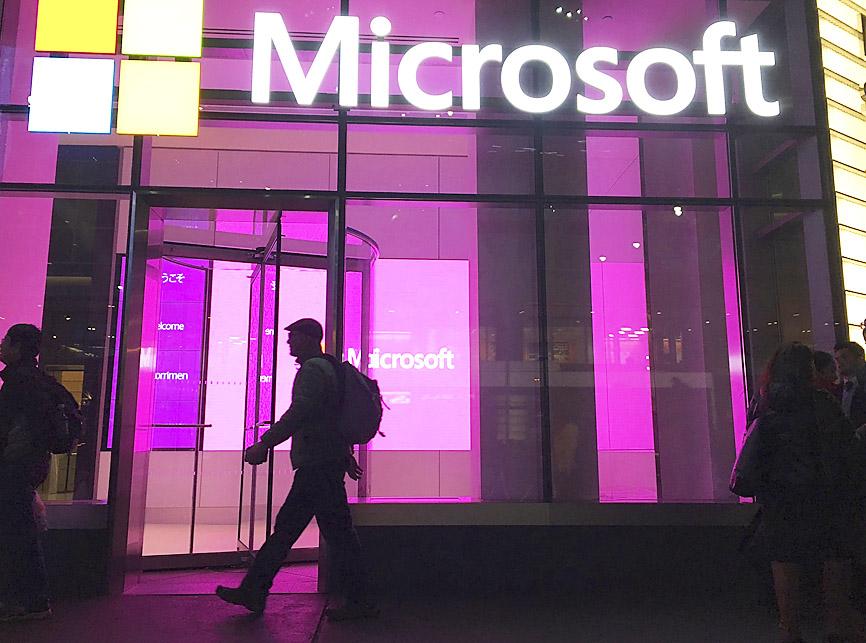China-based government hackers have exploited a bug in Microsoft Corp’s e-mail server software to target US organizations, the company said on Tuesday.
Microsoft said that a “highly skilled and sophisticated” state-sponsored group operating from China has been trying to steal information from a number of targets in the US, including universities, defense contractors, law firms and infectious-disease researchers.
Microsoft has released security upgrades to fix the vulnerabilities to its Exchange Server software, which is used for work e-mail and calendar services, mostly for larger organizations that have their own in-person e-mail servers, the company said.

Photo: Swayne B. Hall, AP
It does not affect personal e-mail accounts or Microsoft’s cloud-based services, it added.
The hacking group it calls Hafnium was able to trick Exchange servers into allowing it to gain access, Microsoft said.
The hackers then masqueraded as someone who should have access and created a way to control the server remotely so that they could steal data from an organization’s network, it added.
Microsoft said that the group is based in China, but operates from leased virtual private servers in the US, which helps it avoid detection.
The company declined to name any specific targets or say how many organizations were affected.
Reston, Virginia-based cybersecurity company Volexity Government Solutions LLC, which Microsoft credits for helping to detect the intrusions, said that its network security monitoring service began investigating a suspiciously large data transfer in late January.
“They’re just downloading e-mail, literally going to town,” Volexity president Steven Adair said, adding that the targets included defense contractors, think tanks, non-governmental organizations, and international aid and development organizations.
Adair said that he is concerned that the hackers might accelerate their activity in the coming days before organizations are able to install Microsoft’s security upgrades.
“As bad as it is now, I think it’s about to get a lot worse,” he said. “This gives them a limited amount of opportunity to go and exploit something. The patch isn’t going to fix that if they left their backdoor behind.”

Application-specific integrated circuit designer Faraday Technology Corp (智原) yesterday said that although revenue this quarter would decline 30 percent from last quarter, it retained its full-year forecast of revenue growth of 100 percent. The company attributed the quarterly drop to a slowdown in customers’ production of chips using Faraday’s advanced packaging technology. The company is still confident about its revenue growth this year, given its strong “design-win” — or the projects it won to help customers design their chips, Faraday president Steve Wang (王國雍) told an online earnings conference. “The design-win this year is better than we expected. We believe we will win

Intel Corp chief executive officer Lip-Bu Tan (陳立武) is expected to meet with Taiwanese suppliers next month in conjunction with the opening of the Computex Taipei trade show, supply chain sources said on Monday. The visit, the first for Tan to Taiwan since assuming his new post last month, would be aimed at enhancing Intel’s ties with suppliers in Taiwan as he attempts to help turn around the struggling US chipmaker, the sources said. Tan is to hold a banquet to celebrate Intel’s 40-year presence in Taiwan before Computex opens on May 20 and invite dozens of Taiwanese suppliers to exchange views

Chizuko Kimura has become the first female sushi chef in the world to win a Michelin star, fulfilling a promise she made to her dying husband to continue his legacy. The 54-year-old Japanese chef regained the Michelin star her late husband, Shunei Kimura, won three years ago for their Sushi Shunei restaurant in Paris. For Shunei Kimura, the star was a dream come true. However, the joy was short-lived. He died from cancer just three months later in June 2022. He was 65. The following year, the restaurant in the heart of Montmartre lost its star rating. Chizuko Kimura insisted that the new star is still down

While China’s leaders use their economic and political might to fight US President Donald Trump’s trade war “to the end,” its army of social media soldiers are embarking on a more humorous campaign online. Trump’s tariff blitz has seen Washington and Beijing impose eye-watering duties on imports from the other, fanning a standoff between the economic superpowers that has sparked global recession fears and sent markets into a tailspin. Trump says his policy is a response to years of being “ripped off” by other countries and aims to bring manufacturing to the US, forcing companies to employ US workers. However, China’s online warriors